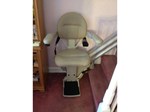There’s no doubt that the technology of the modern stairlift has provided seniors, as well as other individuals with mobility challenges, more choices than were available to previous generations. And for the most part, the benefits of having a stairlift in one’s home outnumber their potential shortcomings. But the prudent consumer should always contemplate both the pros and cons of any purchase in order to make the wisest decision possible. So here are a few things to ponder:
The Pros
If you are a senior who can no longer navigate the stairs, the main reason to have a stairlift installed in your home is because it allows you to stay in your home long after your ability to go up and down the stairs has ended. Most seniors will tell you that staying at home, as opposed to transitioning to senior housing or assisted living, is extremely important to them, as it allows them to remain independent in the most emotionally supportive environment possible.
A stairlift is an accident preventer. The statistics are unambiguous – accidental falls, especially on stairs, are the number one cause of harm to seniors. stairlifts remove the potential for serious and even fatal blunders that can put an elderly person in the hospital, or worse.
stairlifts can carry both people and things. Generations ago, multistory houses had dumbwaiters which allowed for the transport of food, laundry, etc. from floor to floor. The stairlift can easily perform a similar role, as long as the intended object can fit on one’s lap.
For the relatives of seniors or any other individual with mobility challenges, a stairlift can provide piece of mind. Just knowing, for example, that an elderly parent no longer has to try and navigate stairs, can help relieve children of excess worry and concern.
The Cons
Probably the biggest concern that a consumer will have when contemplating the installation of a stairlift, is the cost. A quality lift, plus the installation itself, will run several thousand dollars. For some, that is a potential deal breaker. On the plus side, you might qualify for a medical expense tax deduction and/or the possibility of zero percent financing for up to 18 months.
Another concern: While most homes today have stairways that are wide enough to accommodate a stairlift without any issues, some older homes may have a very narrow stairway, and this is why having a professional assess the home is so important. Also, sometimes a person may have physical limitations in how he or she can sit in a stairlift chair. For example wearing a full leg cast that would cause one to to have to extend a leg may make it impossible to fit in the stairway, while sitting.
Finally, some believe that the installation of a stairlift too soon may create a dependency upon it by an otherwise healthy individual who would still benefit from the exercise of going up and down stairs. This seems a minor concern, as there are many ways in which a mobile senior can still find outlets for physical activity.
At Pacific Mobility, we will never sell or install a stairlift unless it is the right choice for you, your family, your home and your budget. Knowing the pros and cons will help you determine if a stairlift is the best option for you.
https://youtu.be/8s4EkLnQu8Q
President, Husband, Father, Grandfather Graduate of UC Davis- Bio Sci Major- Go Aggies! Jeff has extensive experience in all of Pacific Mobility’s products and services, and specializes in accessibility products as well as stairlifts, ceiling lifts and custom wheel chairs. His hobbies include spending time with family, gardening, mountain biking, exercising and off road motorcycle riding.
24 years as Owner/President of Pacific Mobility Center – selling, installing, and servicing stairlifts, porch lifts, ceiling lifts, pool lifts, handicap ramping, specialty wheelchairs, scooters, power wheel chairs, and other power mobility devices
Certified Environmental Access Consultant since 2008
Licensed General Contractor since 1998
Certified Aging in Place Specialist since 2016
Board Member for Home Access Professionals
Member of Association of Members of the Accessibility Equipment Industry (AEMA)




